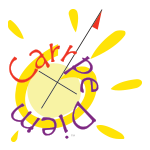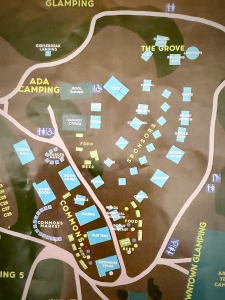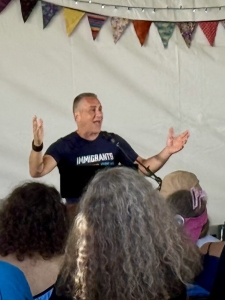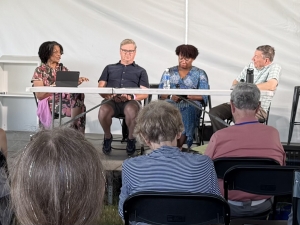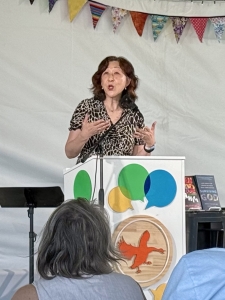One Year After Helene
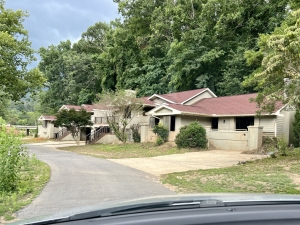
River Knoll community, July 2025
One year after Helene in Western North Carolina (WNC), homes are still in disrepair, roads are still on the “need to repair” list (including I-40), and friends and neighbors continue to seek to recreate “normal” in their lives. The devastation covered a land mass greater than the state of Connecticut. Visitors to our home still get a glimpse of the disaster in our area during the tours of Asheville and the WNC region.
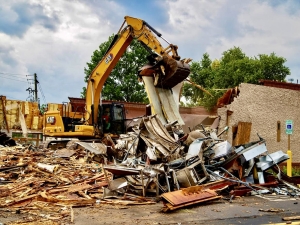
Demolition of the McDonald’s In the Biltmore Village, July 2025.
We had nearly 32″ of rain over three days, which led to 100-year flooding, resulting in 108 verified deaths as of June 17, 2025, over 2,000 landslides, over 400 road closings, over 100 bridges washed out, over 200 swift water rescues, 8.5 million cubic yards of debris, over 100,000 homes without water for 53 days, and power was out in some areas for weeks.
Tourism is vital to Asheville and WNC, and we certainly need it! Slowly, some businesses are coming back. Biltmore Village and the River Arts District are still recovering from the storm’s effects. Swanannoa, Burnsville, Chimney Rock, Marshall, Hot Springs, and other communities and towns in WNC appear to have a longer way to go in their recovery.
What did we learn from Helene in WNC?
Climate change is real, and the flood maps were way off! We are paying attention to other climate change events throughout our country and in the world. Seeing climate change on a screen is one thing; experiencing it is truly understanding its impact is another.
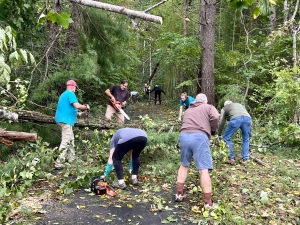
Neighbors helping neighbors, September 28, 2024
While individualism is a core American value rooted in our nation’s history, emphasizing personal freedom, self-reliance, and individual rights, commUNITY was essential in dealing with Helene’s aftermath. It became necessary to know our neighbors and their needs so that we could support one another, despite our differences in opinions and beliefs.
We had to embrace common knowledge, seek the truth, and reject and refute conspiracy theories, fake news, and false reports. Our local NPR station, Blue Ridge Public Radio* (BPR), became a lifeline. It was the news source we could trust and rely on. Their on-the-ground reporters gave us up-to-date news. They carried the twice-a-day live news updates from the City of Asheville and the Water Resources Department, Buncombe County, law enforcement, health services, and Duke Power
We learned to challenge assumptions. Living in the mountains does not mean we are immune to hurricanes and tornadoes. We take water for granted and fail to recognize how much it is a part of our daily lives!
We learned that the role of diversity, equity, inclusion, and belonging was essential in support and healing. Some of us possessed unique gifts, talents, and passions that contributed to our recovery. Some of us had tools to share that benefited the community. Some of us relied on others for essentials like water, ice, food, medication, and even a battery-powered light to turn on at night. Some of us needed a smile, a kind word, a voice of encouragement, a laugh, and a hug. We needed to remind each other that we were in this together and we would overcome this disaster and continue to do so.
We also learned the importance of the Boy Scout motto, Be Prepared, and having essentials on hand, including cash, water, food, a battery-powered radio, blankets, a gas grill or stove, and a generator.
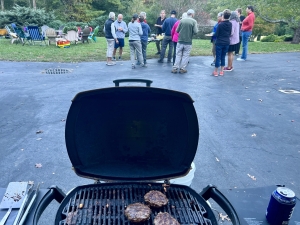
Daily gathering of neighbors for dinner, October 10, 2024
What did we lose from Helene in WNC?
Besides losing water (from handwashing, showers, washing dishes, and clothes), and power. We also lost many other things. Some of us lost everything, including family, friends, coworkers, pets, and livestock; all of us lost something. We lost innocence and safety. We lost routines like going to school, work, and going to the grocery store. We have lost confidence and hope in the systems that are supposed to help us, including those of politicians.
What are we grateful for from Helene in WNC?
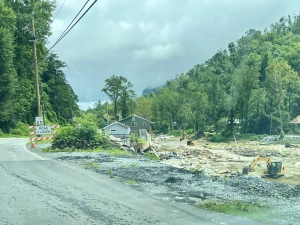
Chimney Rock – Broad River debris removal, August 11, 2025
We are grateful for heroes, such as first responders (locally and nationally), the Asheville Water Department staff (and all the support beyond WNC), Duke Power, and all the utilities from across the country that came to help restore power, as well as the tree services and debris removal services. We are grateful for the World Central Kitchen and faith-based organizations that provided us with hot meals when we couldn’t prepare them for ourselves. We are grateful to our family and friends outside our community who continually reach out to check on how we are doing and ask how they can assist us. We are thankful for our neighbors. Our relationships have deepened. We recognize the gift of connection and feel blessed! We love and appreciate Asheville and WNC more than ever!
Please visit and support WNC as we continue to rebuild.
I wrote several blogs back in late 2024 about our experience with Helene.
What Is A Typical Day Like Without Power, Internet, or Water?
Four Reasons NOT to Come to Asheville, NC, Right Now
* Blue Ridge Public Radio lost $330,000 in funding with the termination of the Corporation for Public Broadcasting. Please support BPR and your local NPR radio stations with a sustaining monthly gift. Any and every contribution helps to maintain this vital source of news and information throughout our country.
